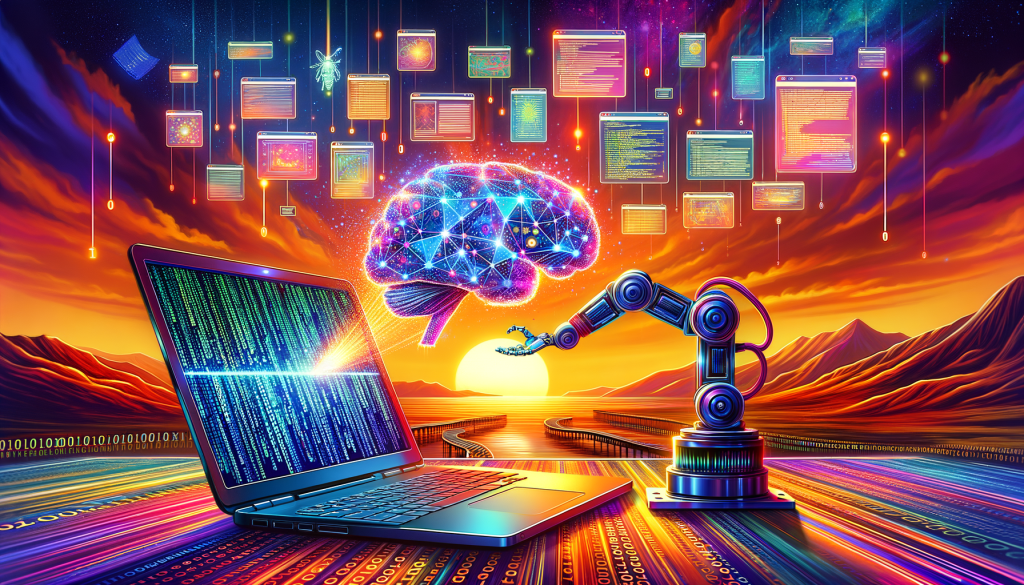Introduction to Machine Learning in Web Development
Machine Learning is a branch of Artificial Intelligence (AI) that focuses on the development of algorithms and models that allow computers to learn and make predictions or decisions without being explicitly programmed. It is a powerful tool that has been widely adopted in various industries, including web development.
In the context of web development, machine learning can be used to improve the user experience, personalize content, and optimize various processes. By analyzing large amounts of data, machine learning algorithms can identify patterns and make predictions that can help developers create more efficient and effective web applications.
One of the main applications of machine learning in web development is in recommendation systems. These systems analyze user behavior, preferences, and interactions to provide personalized recommendations for products, services, or content. By leveraging machine learning algorithms, websites can offer users a more tailored and relevant experience, increasing engagement and conversion rates.
Another area where machine learning is making an impact in web development is in natural language processing (NLP). NLP algorithms can understand and interpret human language, allowing websites to provide more accurate search results, chatbots for customer support, and sentiment analysis for social media monitoring.
Machine learning can also be used for predictive analytics in web development. By analyzing historical data, machine learning models can make predictions about future outcomes, such as user behavior, sales trends, or website performance. This can help developers make data-driven decisions and optimize their web applications for better results.
Overall, machine learning plays a crucial role in web development by enabling developers to create more intelligent and personalized web applications. By leveraging the power of algorithms and data analysis, machine learning can enhance the user experience, optimize processes, and drive business growth in the digital world.
How Machine Learning Enhances User Experience
Machine learning plays a crucial role in enhancing user experience in web development. By analyzing and learning from user behavior, machine learning algorithms can personalize and optimize the user experience to meet individual preferences and needs. Here are some ways in which machine learning enhances user experience:
- Personalized Recommendations: Machine learning algorithms can analyze a user’s browsing and purchase history to provide personalized product recommendations. This helps users discover new products or services that align with their interests, leading to a more engaging and satisfying user experience.
- Improved Search Results: Machine learning algorithms can understand user search queries and provide more accurate and relevant search results. By analyzing patterns and context, these algorithms can better understand user intent and deliver more precise results, saving users time and effort.
- Intelligent Chatbots: Machine learning enables the development of intelligent chatbots that can understand and respond to user queries in a conversational manner. These chatbots can learn from previous interactions and improve over time, providing users with more personalized and efficient support.
- Dynamic Content Personalization: Machine learning algorithms can analyze user preferences, behavior, and demographic data to dynamically personalize website content. This includes customizing product recommendations, content layout, and even the overall website design to cater to individual user preferences, resulting in a more engaging and tailored user experience.
- Fraud Detection: Machine learning algorithms can analyze large volumes of data to detect patterns and anomalies that indicate fraudulent activities. By identifying suspicious behavior in real-time, machine learning can enhance user security and protect users from potential scams or unauthorized access.
Overall, machine learning empowers web developers to create more personalized, efficient, and secure user experiences by leveraging the power of data analysis and pattern recognition. As technology continues to advance, machine learning will play an increasingly vital role in shaping the future of web development and enhancing user experiences across a wide range of industries.
Improving Website Performance with Machine Learning
Machine learning plays a crucial role in improving website performance by optimizing various aspects of web development. Through its ability to analyze large amounts of data and make predictions, machine learning algorithms can help enhance the user experience, increase conversion rates, and optimize website speed.
One way machine learning improves website performance is through personalized user experiences. By analyzing user behavior patterns and preferences, machine learning algorithms can deliver personalized content and recommendations. This not only enhances user satisfaction but also increases the likelihood of conversions and customer loyalty.
Another aspect where machine learning excels is in improving website speed. Slow-loading websites can lead to higher bounce rates and decreased user engagement. Machine learning algorithms can analyze website performance data, identify bottlenecks, and suggest optimizations to improve loading times. By leveraging this technology, developers can ensure that websites load quickly and provide a seamless browsing experience.
Additionally, machine learning can aid in detecting and mitigating security threats. With the increasing number of cyberattacks, it is crucial to implement robust security measures. Machine learning algorithms can analyze network traffic, identify anomalous patterns, and detect potential security breaches. This enables developers to proactively address vulnerabilities and protect sensitive user data.
Moreover, machine learning algorithms can assist in search engine optimization (SEO) efforts. By analyzing user search queries, website content, and other relevant factors, machine learning algorithms can provide insights to improve search engine rankings. This helps increase organic traffic and visibility, ultimately leading to higher website performance.
In conclusion, machine learning plays a vital role in enhancing website performance by optimizing various aspects of web development. From personalized user experiences to improving website speed, detecting security threats, and aiding in SEO efforts, machine learning algorithms offer valuable insights and optimizations. Incorporating machine learning into web development practices can lead to more efficient, user-friendly, and successful websites.
Machine Learning for Personalized Recommendations
Machine learning plays a crucial role in web development, particularly in the area of personalized recommendations. By utilizing data and algorithms, machine learning algorithms can analyze user behavior and preferences to provide tailor-made recommendations for each individual user.
There are several techniques and algorithms used in machine learning for personalized recommendations:
- Collaborative Filtering: This technique analyzes the patterns of user behavior and preferences to identify similarities between users. It then recommends items to a user based on the preferences of similar users.
- Content-Based Filtering: In this approach, the algorithm analyzes the attributes and characteristics of items to recommend similar items to a user based on their previous interactions.
- Hybrid Filtering: This method combines both collaborative filtering and content-based filtering to provide more accurate and diverse recommendations.
Machine learning algorithms for personalized recommendations require a large amount of data to effectively analyze user behavior and preferences. This data can include user demographics, browsing history, purchase history, ratings, and reviews. By continuously analyzing this data, the algorithms can improve the accuracy of recommendations over time.
Implementing machine learning for personalized recommendations can greatly enhance the user experience on websites and applications. Users are more likely to engage with personalized recommendations, leading to increased customer satisfaction and retention.
Overall, machine learning plays a vital role in web development by enabling personalized recommendations. By leveraging data and algorithms, websites and applications can provide tailored suggestions to each individual user, ultimately improving the overall user experience.
Securing Web Applications with Machine Learning
Machine learning plays a crucial role in securing web applications, as it can help identify and prevent various types of cyber attacks. By analyzing patterns and behaviors, machine learning algorithms can detect anomalies and malicious activities in real-time, providing enhanced security measures for web applications.
There are several ways in which machine learning can be utilized to secure web applications:
- Malware Detection: Machine learning algorithms can be trained to recognize patterns associated with malware and malicious code. By analyzing the code and behavior of web applications, these algorithms can identify and block potential threats, protecting the application and its users.
- Bot Detection: Bots can be a significant threat to web applications, as they can perform automated attacks and compromise user data. Machine learning techniques can be employed to distinguish between legitimate users and malicious bots, enabling the application to take appropriate actions to mitigate the risk.
- Authentication and Authorization: Machine learning algorithms can be utilized to analyze user behavior patterns and identify anomalies that may indicate unauthorized access attempts. By continuously learning from user interactions, these algorithms can provide more accurate and robust authentication and authorization mechanisms.
- Threat Intelligence: Machine learning models can be trained on vast amounts of data from various sources, including security blogs, forums, and incident reports. This enables them to stay updated with the latest threats and provide proactive protection against emerging risks.
By leveraging machine learning in web development, organizations can enhance the security of their web applications and protect sensitive data from potential cyber attacks. It allows for real-time detection and prevention of threats, reducing the likelihood of successful attacks and providing a safer browsing experience for users.
Future Possibilities and Challenges of Machine Learning in Web Development
Machine learning has the potential to revolutionize web development in the future. With the ability to analyze large amounts of data and make predictions, machine learning algorithms can enhance the user experience, improve website performance, and automate various tasks.
One of the main possibilities of machine learning in web development is personalization. By analyzing user behavior and preferences, machine learning algorithms can create personalized recommendations and content for individual users. This can greatly improve user engagement and satisfaction, leading to increased conversions and loyalty.
Another possibility is the automation of repetitive tasks. Machine learning algorithms can be trained to automate tasks such as data entry, content generation, and even bug detection. This can save developers a significant amount of time and effort, allowing them to focus on more complex and creative tasks.
Machine learning can also help in improving website performance. By analyzing user data and patterns, algorithms can identify areas for optimization and suggest improvements. This can result in faster load times, reduced bounce rates, and better overall user experience.
However, there are also challenges that come with the integration of machine learning in web development. One major challenge is the need for high-quality training data. Machine learning algorithms rely on large amounts of data to make accurate predictions, and obtaining this data can be a complex and time-consuming process.
Another challenge is the potential for bias in machine learning algorithms. If the training data is not diverse and representative, the algorithm may learn and perpetuate biases, leading to unfair or discriminatory outcomes. Ensuring fairness and transparency in machine learning algorithms is essential to avoid these issues.
Furthermore, there is a need for skilled professionals who can develop and maintain machine learning models in the web development industry. As machine learning becomes more prevalent, the demand for professionals with expertise in this field will continue to grow.
Overall, the future possibilities of machine learning in web development are exciting. From personalization to automation and performance optimization, machine learning has the potential to greatly enhance the web development process. However, it is important to address the challenges associated with machine learning, such as data quality and bias, to ensure ethical and effective implementation.






I recently implemented machine learning algorithms in a web development project, and I must say, it has completely transformed the user experience. The ability to personalize content and predict user behavior has been a game-changer. I’m curious to know more about the potential challenges and limitations of using machine learning in web development.
As a web developer, I’ve seen the impact of machine learning firsthand. It has simplified complex tasks like data analysis and pattern recognition, allowing for more efficient and effective web applications. However, I’m interested in learning about the best practices for integrating machine learning models into web development projects.
I’ve been exploring the intersection of machine learning and web development, and I’m fascinated by the potential it holds for creating dynamic and personalized user experiences. I’d love to hear more about real-world examples of successful integration of machine learning in web development.
Machine learning has undoubtedly revolutionized web development by enabling intelligent decision-making and automation. I’m interested in understanding the prerequisites for developers to start incorporating machine learning into their web projects and the resources available for learning this technology.
I’m new to the world of machine learning and its applications in web development. Can someone explain how machine learning can enhance website security and user authentication? I’m eager to grasp the potential benefits and implications of integrating machine learning algorithms into web development.